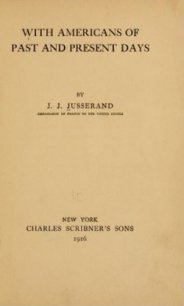With Americans of Past and Present Days - Jusserand Jean Jules (книги онлайн txt) 📗
Жалоба
Напишите нам, и мы в срочном порядке примем меры.
With Americans of Past and Present Days - Jusserand Jean Jules (книги онлайн txt) 📗 краткое содержание
Under the above title M. Jusserand presents the American public with a series of seven studies and addresses which are dedicated in graceful fashion to the thirteen original states. The reputation of the author as a scholar, a statesman, and a master of English style will ensure the volume careful attention, which will not be misplaced. Much new and interesting material has been here collected and interpreted by M. Jusserand to whom the task has evidently been a labor of love.
The first three sections, entitled “Rochambeau in America,” “L’Enfant and the federal city,” and “Washington and the French,” comprise nearly four-fifths of the entire volume and are, as the author suggests, compilations of various speeches delivered at different times during the thirteen years of the ambassador's mission here. They deal with the history of the official French cooperation with the American forces during the concluding years of the revolution, with the attitude of Washington toward France and his personal friendships with the leaders and with some very interesting details connected with the establishment of our national capital. The material is largely drawn from the store of Franco-American correspondence, published and unpublished, and from a number of works many of which are familiar only to historians of the period. M. Jusserand is explicit in his citations and one is much impressed with the fruitfulness of the field for further investigation.
Americans generally do not feel that Rochambeau is as romantic a figure as the gallant Lafayette but in the first article we learn how effective his force was in a military way to the final outcome because of the way it kept Clinton inactive in New York, preventing reinforcements to Cornwallis, and because of the encouragement it gave to the Americans and by the part it played at Yorktown. Stress is laid upon the operations of the French fleet under De Grasse, who is noted as “the single one of the leaders to whom no memorial has been dedicated.” Many other slightly known figures are done a tardy justice and we are given details as to the later years of the French commander.
The space devoted to Major L’Enfant contains much information that is valuable concerning the planning of the national capital. One sympathizes with the ambitions of the engineer, regrets the neglect which he suffered, due in part to his temperamental nature, and welcomes the vindication his ideas received at the hands of the committee of 1902 which declared for a return in all respects to the original plan.
Washington is presented in a new light for the third section is centered about his relations toward the French and his changes in view as time passed. From a distrust derived from his experiences in the colonial wars and a suspicion of French motives during the early years of the revolution, Washington seems to have come to a wholehearted acceptance of his allies and a sincere friendship for their leaders which is manifest in his correspondence. Various instances of his keen political observation are quoted and much space is devoted to an account of French tributes at the time of Washington’s death.
The fourth essay, devoted to Abraham Lincoln, aims to throw new light upon French public opinion during our civil war. While it contains a eulogy of Lincoln and reviews his life, the chief stress is laid upon the real sympathy of the French people with the cause of the north, no matter what the attitude of Napoleon III may have been. M. Jusserand quotes among other things the letter of Gasparin to Lincoln, the efforts of Frenchmen like the Comte de Paris, General de Trobriand and others, the medal sent to Mrs. Lincoln and a host of tributes coming from all classes and factions to support his view. We must confess ignorance that such a feeling for Lincoln existed among the French people.
The last three portions are short addresses, given as delivered, upon accepting the Franklin medal, on Furness, the Shakesperean scholar, and upon “From war to peace.” The last was delivered in 1910 and is almost prophetic in view of recent events.
The purpose of the volume if we may hazard a guess, is to add to the keen sympathy felt in America for France by reminding us of her part in our history and by showing how her ideals correspond with our own. This thread pervades everything and, if it is a work of propaganda, it is distinguished by good taste and fortified by fact. The author is conspicuously cordial toward England and the English leaders. He repeatedly refers to the lack of national hostility and the friendship of Rochambeau and Cornwallis. No Englishman comes in for criticism, not even the infamous Tarleton. Quite a contrary attitude is manifest in his reference to Frederick the Great, whose regard for Washington is frequently asserted; he reminds us that Prussia refused us formal aid and he indulges in sarcasm at the expense of the Hessians. The object is apparently to show France, England, and America linked together by a common ideal. One cannot help wondering at the scant attention shown to Lafayette, probably in order to bring Rochambeau into prominence.
Well-written, interesting, accurate (save for the slight pro-English touch), the work of M. Jusserand cannot fail to stimulate American feeling for France.
________________________________________
Review by: H. R. Brush
The Mississippi Valley Historical Review
Vol. 4, No. 1 (Jun., 1917), pp. 112-114
With Americans of Past and Present Days читать онлайн бесплатно
The Project Gutenberg EBook of With Americans of Past and Present Days, by
J. J. Jusserand
This eBook is for the use of anyone anywhere at no cost and with
almost no restrictions whatsoever. You may copy it, give it away or
re-use it under the terms of the Project Gutenberg License included
with this eBook or online at www.gutenberg.org
Title: With Americans of Past and Present Days
Author: J. J. Jusserand
Release Date: June 9, 2012 [EBook #39954]
Language: English
*** START OF THIS PROJECT GUTENBERG EBOOK AMERICANS ***
Produced by David Edwards, Margo Romberg and the Online
Distributed Proofreading Team at http://www.pgdp.net (This
file was produced from images generously made available
by The Internet Archive)
WITH AMERICANS OF
PAST AND PRESENT DAYS
WITH AMERICANS OF
PAST AND PRESENT DAYS
BY
J.J. JUSSERAND
AMBASSADOR OF FRANCE TO THE UNITED STATES
NEW YORK
CHARLES SCRIBNER'S SONS
1916
Copyright, 1916, by
CHARLES SCRIBNER'S SONS
Published May, 1916

DEDICATION
This day, thirteen years ago, a new French ambassador presented his credentials. The ambassador was not very old for an ambassador. The President was very young for a president, the youngest, in fact, the United States ever had. Both, according to custom, read set speeches, and there followed a first conversation, which had a great many successors, touching on a variety of subjects not connected, all of them, with diplomacy. In which talk took part the genial, learned, and warm-hearted author of the "Pike County Ballads" and of the Life of Lincoln, present at the meeting as Secretary of State of the United States.
This was the first direct impression the newcomer had of broad-minded, strenuous America, his earliest ones, as a child, having been derived from the illustrated weekly paper received by his family, and which offered to view fancy pictures of the battles between the bearded soldiers of Grant and Lee, the "poilus" of those days; another impression was from Cooper's tales, Deerslayer sharing with Ivanhoe the enthusiasm of the young people at the family hearth. Another American impression was received by them a little later, when, the Republic having been proclaimed, the street where the family had their winter home ceased to be called "Rue de la Reine" and became "Rue Franklin."
Thirteen years is a long space of time in an ambassador's life; it is not an insignificant one in the life of such a youthful nation as the United States; I have now witnessed the eleventh part of that life. Something like one-fourth or one-fifth of the population has been added since I began service here. There were forty-five States then instead of forty-eight; the commercial intercourse with France was half of what it is now; the tonnage of the American navy was less than half what it is at present; the Panama Canal was not yet American; the aeroplane was unknown; the automobile practically unused. Among artists, thinkers, humorists, critics, scientists, shone La Farge, McKim, Saint-Gaudens, William James, Mark Twain, Furness, Newcomb, Weir Mitchell, who, leaving a lasting fame, have all passed away.
The speech at the White House was followed by many others. Little enough accustomed, up to then, to addressing any assembly at any time, I did not expect to have much to do in that line; but I had. I soon found that it was not a question of taste and personal disposition, but one of courtesy and friendliness. The quick-witted, kindly-disposed, warm-hearted audiences of America, ever ready to show appreciation for any effort, greatly facilitated matters.
I was thus led by degrees to address gatherings of many kinds, in many places, on many subjects, from the origins of the War of Independence to reforestation in America, and from the Civil War to infantile mortality. Many such speeches had to be delivered impromptu; others, luckily for both orator and listeners, were on subjects which the former had studied with as much care as the fulfilling of a variety of tasks and duties had allowed him.
An examination of the development of the two countries will, I believe, lead any impartial mind to the conclusion that, with so many peculiar ties between them in the past, a similar goal ahead of them, and, to a great extent, similar hard problems to solve, it cannot but be of advantage to themselves and to the liberal world that the two Republics facing each other across the broad ocean, one nearly half a century old, the other three times as much, should ever live on terms of amity, not to say intimacy, comparing experiences, of help to one another whenever circumstances allow: this they have been on more than one occasion, and will doubtless be again in the future. During our present trials the active generosity of American men and women has exerted itself in a way that can never be forgotten.
The dean now, not only of the diplomatic corps in Washington, but of all my predecessors from the early days, when, on a raised platform in Independence Hall, my diplomatic ancestor, Gerard de Rayneval, presented to Congress the first credentials brought here from abroad (and Gerard was then, he alone, the whole diplomatic body), I have presumed to gather together a few studies on some of the men or events of most interest from the point of view of Franco-American relations. Three addresses are added, just as they were delivered. May these pages find among readers the same indulgent reception their author found among listeners.





